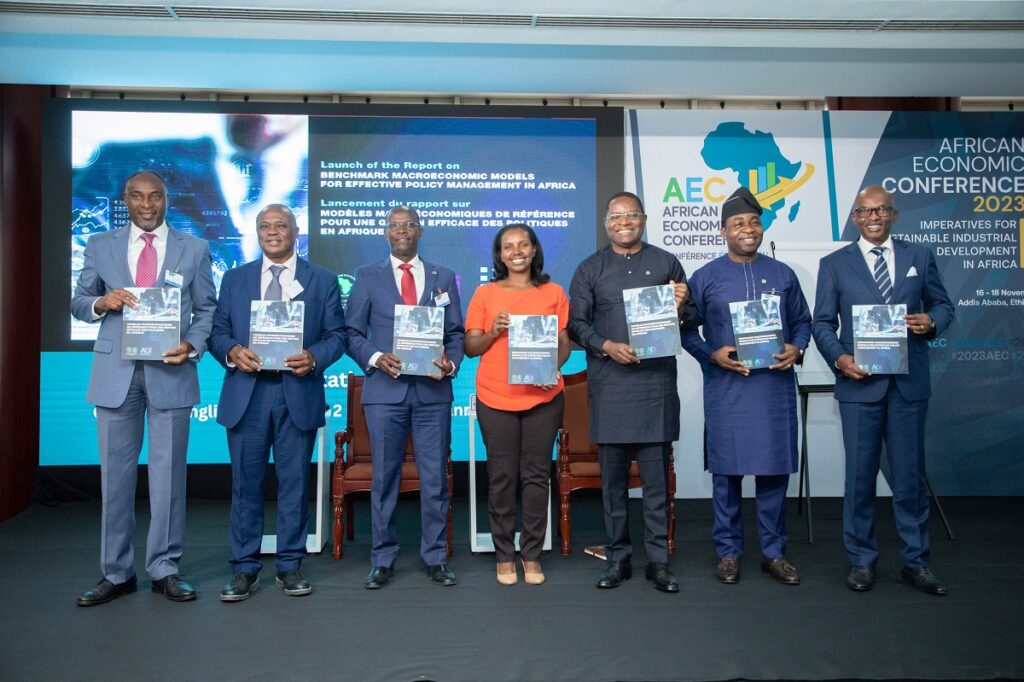- African countries continue to grapple with substantial capacity gaps in macroeconomic modeling, a new report by AfDB shows.
- The findings underscore the need for further enhancement in macroeconomic modeling capabilities across African economies.
- The report offers insights into the models and modeling capacities present in roughly 31 out of 54 African states.
Despite notable progress in forecasting, analysis, and effective policy management, a recent study by the African Development Bank (AfDB) Group reveals that African countries continue to grapple with substantial capacity gaps in macroeconomic modeling.
Titled “Benchmark Macroeconomic Models for Effective Policy Management in Africa,” the report was unveiled in Addis Ababa, Ethiopian, on 18 November. The launch took place alongside the African Economic Conference 2023 and was conducted by the AfDB Group. The findings underscore the need for further enhancement in macroeconomic modeling capabilities across African nations to bolster their ability to formulate and execute effective policies.
Role of macroeconomic modeling in African economies
Covering 31 out of 54 African countries, the research was conducted through collaboration between AfDB Group and Central Banks, as well as Ministries of Finance and Planning. The Nairobi-based African Economic Research Consortium provided additional support for the study.
Macroeconomic modeling serve as essential instrument for nations to gain a comprehensive understanding of their economies and forecast their behavior. These models play a crucial role in analyzing various policy response options, assessing potential outcomes, and offering guidance for the implementation, monitoring, and evaluation of policies.
By aiding in decision-making, these models contribute valuable insights for economic and business projections. They achieve this by collecting and analyzing data on critical economic indicators such as inflation, unemployment, GDP, and the dynamics of supply and demand.
Prof. Kevin Chika Urama, the Chief Economist and Vice President for Economic Governance and Knowledge Management at the Bank, highlighted that the report serves as a comprehensive resource, offering insights into the models and modeling capacities present in African nations. It delves into their applicability to the development context, particularly as the continent confronts recurring challenges.
He stressed the importance of macroeconomic modelling as a tool for countries to effectively understand and predict the behaviour of their economies.
“But models are only attempts to simplify realities in a logical manner to inform decision-making under specific assumptions, contexts and realities,” Urama said. “Models are therefore as relevant as the extent to which they approximate realities and can inform appropriate decision making in specific contexts.”
Addressing the launch event, Shalom Gebredingel, Chief of Staff and Special Advisor to Ethiopia’s Minister for Planning and Development, emphasized that the report transcends being a mere compilation of data.
“It represents a shared commitment to transformative change. It is a call to action, urging us to rethink our approach, question assumptions and embrace innovation in our policy endeavors,” she said.
Read also: Africa’s youth charged to take lead in climate change conversation
Complex macroeconomic challenges gripping Africa economies
In recent times, Africa has navigated through a complex landscape marked by significant challenges. The COVID-19 pandemic, with its widespread health and socioeconomic implications, has been a formidable adversary for the continent. The ripple effects of Russia’s invasion of Ukraine have also reverberated across Africa, introducing geopolitical complexities that demand careful navigation.
Additionally, the continent has been grappling with the far-reaching consequences of climate change, manifested in the form of severe droughts and flooding. These environmental challenges further compound the multifaceted nature of the issues faced by African nations.
Shalom Gebredingel, Chief of Staff and Special Advisor to Ethiopia’s Minister for Planning and Development, highlighted the interconnectedness of these challenges, emphasizing the need for comprehensive and strategic approaches to address the pressing issues.
The confluence of health crises, geopolitical tensions, and environmental vulnerabilities underscores the importance of concerted efforts and international collaboration to foster resilience and sustainable development across the African continent.
Such challenges highlight “the crucial emphasis for policymakers to comprehend as well as skillfully navigate the intricate interplay of global, regional and local dynamics of our economies,” she said.
Presenting the study’s findings, Dr. Eric Ogunleye, Division Manager for the Policy Management Division at the African Development Institute, outlined its primary objectives. The study aimed to conduct a comprehensive assessment of the models accessible in African countries, scrutinizing their operational efficacy and suitability for the intended purposes, as explained by Ogunleye.
The AfDB Group seeks to ensure that its capacity development initiatives within member countries align with the specific demands and contexts of each nation, emphasizing a tailored and demand-driven approach to enhance effectiveness.
Issues and capacity gaps on macroeconomic modeling
“Before we think about defining any macroeconomic management capacity development initiative to support our regional member countries, we deem it fit to have first-hand understanding of the issues and capacity gaps on the ground and that was the motivation for this study,” he said.
The Africa Economic Conference took place from 16–18 November 2023 in Addis Ababa under the theme “Imperatives for Sustainable Industrial Development in Africa”.
Organised by the African Development Bank, the United Nations Economic Commission for Africa and the United Nations Development Programme, the 18th edition of the conference brought together experts, the private sector, researchers, and young people to discuss the challenges and prospects of industrialization in Africa.
